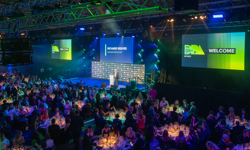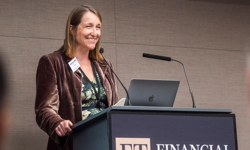Events are becoming an increasingly important part of publisher activities. Indeed, as Jim Bilton told delegates in the opening session of the day, some B2B media companies see themselves as ‘events companies’, not publishers. Witness UBM’s “events first” strategy. At Decanter magazine, where Motor Sport’s Sophia Dempsey worked previously, events were continually growing in importance vis-à-vis the traditional magazine. Events are, said Jim, likely to be a major growth area for publishers in 2017.
The size of the publishing operation was also no barrier to success in the events space, we heard; music to the ears of the small to medium sized publishers that make up the PPA’s Independent Publishers Network. As session moderator Helen Coetzee noted, smaller publishers often had the agility to respond quicker to market opportunities than bigger ones. MA Exhibitions’ Ed Tranter went further. The recent creation and rapid success of his company (part of the Mark Allen Group) would have been impossible if the company had not been small and entrepreneurial. Ed has worked for a number of big publishers in his time, and in his opinion, if he’d tried to get the idea off the ground with any of them, they’d “still be talking about it now!” “Small companies are uniquely well placed to put on large events”, he said.
Furthermore, publishers, whether large or small, possess the single most important ingredient for putting on a successful event – market-knowledge; everything else, said Ed, can be bought. According to Gruppo Media’s Bruce Sandell, having a magazine gave his company “permission” to work in lots of other areas. The magazine opened the events door.
So, what makes events such an attractive field to get into? A number of things: it’s great for cash-flow. Bruce Sandell, who has just staged the second of their Rouleur Classic cycling events, reported that the complete rebook for their third event, to be staged next November, was done and dusted within a month of the close of the second event. The typical revenue model for events means that the bulk of the revenue is in the bank before your main costs have been incurred, which also helps reduce exposure to risk. Events, said Ed Tranter, bring in new customers – in his experience, 50-60% of stand bookings were from customers who had never advertised in print, yet many of them subsequently started to do so! A virtuous circle.
But it’s not just about the direct revenue-making opportunities. Events are great for lead generation, database building and content creation. As we heard from Faversham House CEO Amanda Barnes in one of the later panel sessions, her company recorded over 200 hours of video for the 2016 iteration of UtilityWeekLive (up from two hours the year before). The footage included seminar sessions, individual presentations, contributions from experts and interviews with delegates and stand-holders, all of which were then edited to create daily highlights packages, promotional videos and news stories.
Events is a great idea, but avoid putting on a rubbish one at all costs! The damage you risk inflicting on your brand could be terminal, so you need to research the market thoroughly. Talk to your target audience (the visitors!) and build a show around their needs. Don’t, the panel all agreed, get trapped into building an event around the perceived needs of two or three main sponsors. At this point, the attendees come first. If you can’t get them to show up in sufficient numbers, then you won’t have a second show, however chummy you are with the sponsors. Certainly don’t ignore your potential stand-buyers – talk to them too, and find out what they don’t like about the existing events in your market and feed this into your event planning.
Getting your first event off the ground requires a lot of hard work. In the early days, said Ed Tranter, staff will need to double up on roles and you will need to do deals with partners (eg registration service providers, specialist contractors et al). MA Exhibitions held out the prospect of jam tomorrow to companies who would agree to partner for the long term, but providing their services in the short term at discounted rates. The promise of “let’s grow together” obviously worked, because four of their principal suppliers have been in from day one.
Finally, did the panel have any other tips for creating a successful event? For Sophia Dempsey, it was important to create a three year plan. Yes, breaking even in the first year is possible, but best to have a measured plan. Bruce Sandell advised doing your utmost to find a year one venue with room for growth. His event was forced to relocate (due to its expansion) after the second year, which added an unnecessary complicating factor. Over-achieve, not over-promise, they all agreed. Ed Tranter said, talk to your potential stand-holders to find out “what good looks like”. The figure might be very different to the one you expected. If 800 is seen as ‘good’ and you deliver 1,000 then everyone’s happy. But, if you’d promised them 5,000, then 1,000 would be a massive disappointment. It’s all about managing expectations. Don’t skimp, do things right; the practise of filling unsold stand space with massage tables, fortune tellers, cup-cake sellers and the like is unforgivable.
And, I’ll leave the last word with Ed Tranter. If you’re a publisher who’s umming and ahhing about putting on an event – you know it makes sense, but you’re still not 110% sure, Ed has this advice: “Just do it! Get on and do it!” Well… what are you waiting for?
A photo gallery of the event can be seen here.










